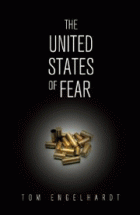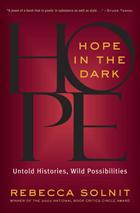[Note for TomDispatch Readers: It’s that time again. Another year-ending moment for this website, which began as a no-name listserv in October 2001 and went online as TomDispatch in December 2002, thanks to Ham Fish of the Nation Institute. It's been plugging away ever since as a “regular antidote to the mainstream media,” doing its best to connect the unconnected dots in our world. (Click here to check out a little piece I wrote for the Moyers & Company website this week about what I call “isolation journalism” in the mainstream media where connections are seldom made.)
With today’s post, we’re closing down for 2012, but expect us back on January 3rd renewed and ready for a new year full of surprises. In the meantime, profuse thanks are due to the stalwart crew who keep TD going: Managing Editor Nick Turse, who will continue to follow the U.S. military as it garrisons the planet in 2013 and will have a remarkable new book on the Vietnam War published as well; Associate Editor Andy Kroll, who will again be on the economic beat for us; Dimitri Siavelis and Joe Duax, who keep the site miraculously shipshape and ready to roll; Christopher Holmes, proofer-extraordinaire who holds error eternally at bay (or at least to a surprising minimum) in our dispatches; and Erika Eichelberger, our maestro of social media, who has brought TD Facebook page and Twitter feed alive this year. (Check us out there if you haven’t yet!) Special thanks are due as well to Andy Breslau, Taya Kitman, and the rest of the staff of the Nation Institute, who continue to stick with us through thick and thin, and finally to Lannan Foundation, which may be last in this list but is certainly first in what it’s done for TomDispatch. Surrounded by such a crowd, life couldn’t be better.
Finally, of course, my deepest thanks to TomDispatch readers all over this country and around the world, whose readership and support make all the difference. Your emails to this site offer tips, catch errors, offer criticism, and reveal unknown worlds to me. They are always read (even when, hard as I try, I’m too busy to answer). What more could I ask? Have a good holiday. See you all in 2013! Tom]
In weather terms, 2012 in New York City began for me with crocuses. On an early February day in a week in which the temperature hit 60 degrees, I spotted their green shoots pushing up through the bare ground of a local park on a morning walk -- just as if it were spring. The year was ending last weekend as I wandered with a friend past a communal garden in the same park and noticed that, in a December week in which the temperatures were in the mid-50s, the last few roses were still in bloom.
In between, in that park on a dark night in late October I watched a white-capped Hudson River roiling like some enraged beast, preparing for a storm surge that would flood lower Manhattan, plunging it into darkness and so turning it into “little North Korea,” briefly making true islanders out of New Yorkers and flooding out whole communities. That, of course, was Hurricane Sandy, the Frankenstorm surprise of New York’s year (though anything but a worst case scenario). And then, there was the American 2012 in which heat eternally set records and we experienced something close to an “endless summer.”
If climate change had a personality in this year of so many grim records -- wildfires, drought, heat, carbon dioxide emissions -- it would definitely be saying: “I’m not the thing your grandchildren will have to deal with, I’m yours!”
In such a new world of upheaval, tradition matters. And there is one inviolable tradition at TomDispatch: Rebecca Solnit has the last word -- as she has for years, peering into the future, sizing up the past, weighing alternatives to what is, and last year considering a season of being Occupied. Now, for the first time in a long while, weather and climate change are a growing American preoccupation. Of course, climate change is an area long occupied by the giant energy companies whose compassion extends no further than their bottom lines (which, like the heat, continue to set historical records). Solnit in her year-ending, TomDispatch-closing piece suggests that it’s time for us to occupy the topic ourselves, and do our best to ensure that this planet, 2013 and beyond, remains a habitable place for us, our children, and our grandchildren. There could be no more powerful New Year’s wish. Tom
The Sky’s the Limit
The Demanding Gifts of 2012
By Rebecca SolnitAs this wild year comes to an end, we return to the season of gifts. Here’s the gift you’re not going to get soon: any conventional version of Paradise. You know, the place where nothing much happens and nothing is demanded of you. The gifts you’ve already been given in 2012 include a struggle over the fate of the Earth. This is probably not exactly what you asked for, and I wish it were otherwise -- but to do good work, to be necessary, to have something to give: these are the true gifts. And at least there’s still a struggle ahead of us, not just doom and despair.
[Note for TomDispatch Readers: Once again, many thanks to all of you who contributed to our year-end funding drive. In the last couple of weeks, amazingly enough, contributions have come in from 40 states and 13 other countries. I can’t thank those of you who ensured that we’ll stay afloat in 2013 enough! (Anyone who meant to send in a contribution -- and possibly get one of our signed TD books in return -- but hasn’t done so yet, don’t forget to check out our donation page.) In addition, a small reminder for the Amazon customers among you. If, in this gift-giving season, you go to Amazon via a TomDispatch book link or book-cover-image link, no matter what you then buy there, TD gets a small cut of your purchase at no extra cost to you. Tom]
The future has its surprises. Even the most farseeing among us, even the seers of the U.S. Intelligence Community, are -- for better or worse -- regularly caught off-guard by what tomorrow has to offer. Take the murderous acts of two disturbed young men. No, not Adam Lanza, but Jared Loughner wielding his Glock semi-automatic pistol with its 33-round extended magazine, and James Holmes with his “semiautomatic variation of the military’s M-16 rifle, a pump-action 12-gauge shotgun, and at least one .40-caliber semiautomatic pistol.”
The attempted assassination of a member of the House of Representatives in Tucson in January 2011 and the mayhem and killings in a movie house in Aurora, Colorado, in July 2012 shocked the nation. Each time, the president comforted an unnerved public, while a downsizing media leapt at the opportunity to focus on a single eyeball-gluing event for days on end (undoubtedly the cheapest way to go). When it comes to the coverage of slaughter-by-gun in America these days -- from teddy bear memorials to religious services, first responders to final burials -- you can almost do it by the numbers, with a rolodex already filled with grief counselors, psychologists, gun experts, religious figures, and the like.
If you had to guess, you might have said that no two events were more likely to put the issue of guns and gun control back on the American agenda -- and of course you would have been wrong. Afterwards, if you had read the experts and the pundits, you would have known that the issue of gun control was as dead as any of the victims of those massacres and off the American agenda for years, if not forever. The polls assured us of the same. The conclusion seemed clear enough: American innocents could die en masse at the hands of disturbed guys with access to powerful weaponry and the public would still prefer fewer controls on weapons.
All that held true until a disturbed young man, who had killed his gun-hobbyist (possibly gun-obsessive) mother and then employed a rifle that the New York Times described as “a semiautomatic... that is similar to weapons used by troops in Afghanistan,” massacred 20 small children, a school principal, and five staff members at Sandy Hook Elementary School in Newtown, a (gun-loving) Connecticut community.
Once again, we had days of obliterating media coverage, with the usual experts, pundits, and rites, including a community in shock, grieving, and pulling itself together, and of course President Obama comforting its citizens with “the whole world watching.” Once again, mindboggling facts about gun-selling and gun-ownership in this country began making the rounds: there are only 14,000 more gas stations than federally licensed firearms dealers in the United States (143,839 to 129,817); more than nine times as many dealers as McDonalds (14,098); and by conservative estimate, 3.3-3.5 million of the AR-15-style rifle used by Lanza have been produced for domestic use since 1986 in the U.S.
This time, however, something different happened, something no one had expected or predicted, that, in fact, everyone knew was inconceivable: the polls showed sudden, spasmic surges of support for stricter gun laws (an overnight 18% rise in the latest CBS poll, for example). Suddenly, gun control was on everyone’s agenda, a ban on assault weapons on lips all over Washington (and backed by the president), and movement in the air. In such a heavily armed and fear-ridden country, all of this may not, in the end, add up to a hill of beans (or ammo) in policy terms, but it remains striking nonetheless.
Looking ahead, the lesson is simple enough: when it comes to 2013, take the predictions of the pundits with a grain of salt. Ignore everyone who knows that the usual will be the norm and make a New Year’s wish for the surprises that, looking backward, litter history. One possibility that not a pundit anywhere in the U.S. mainstream is likely to consider at the moment: that next year, for the first time in memory, the U.S. and Israel, as TomDispatch regular and professor of religious studies Ira Chernus suggests, may be genuinely at odds, and that Washington may, at long last, move to put the brakes on Israeli settlement expansion into Palestinian lands. Tom
Are the U.S. and Israel Heading for a Showdown?
No One Thinks So, But It Just Might Happen
By Ira ChernusHere’s the question no one is asking as 2012 ends, especially given the effusive public support the Obama administration offered Israel in its recent conflict with Hamas in Gaza: Will 2013 be a year of confrontation between Washington and Jerusalem? It’s on no one’s agenda for the New Year. But it could happen anyway.
On New Year's Eve 2003, Khaled el-Masri, an unemployed car salesman from Germany on vacation in Macedonia, was removed from a bus and kidnapped by the CIA due to a confusion of names. His evidently bore some similarity to an al-Qaeda suspect the Agency wanted to get its hands on. Five months later, after spending time under brutal conditions in an “Afghan” prison called “the Salt Pit” (run by the CIA), he was left at the side of a road in Albania. In between, his life was a catalogue of horrors, torture, and abuse.
Last week, the European Court of Human Rights finally rendered a judgment in his favor, confirming the accuracy of the story he’s told for years about his sufferings, fining the Macedonian government for its role in his case, and concluding for the first time in a court of law that “the CIA's rendition techniques amounted to torture.” El-Masri’s attempt to bring a case in the U.S. legal system against “George Tenet, the former director of the C.I.A., three private airline companies, and 20 individuals identified only as John Doe” for his mistreatment was long ago thrown out, thanks to the “state secrets privilege” -- such a trial, so the government claimed, could compromise U.S. national security. In this way, American courts, including the Supreme Court, typically avoided the subject of Bush administration and CIA torture tactics.
El-Masri was one of more than 9,000 individuals who were then being held in a globe-spanning archipelago of injustice, a series of “black sites” and borrowed prisons (as well as borrowed torturers in many cases). Some of those prisoners were, like el-Masri, innocent of any crime whatsoever; some like him had been kidnapped by the CIA; most, whether reasonable suspects or not, were charged with nothing. The crown jewel of this system was, of course, the U.S. prison built in Guantanamo Bay, Cuba, which the present president promised to close within a year of coming into office and which still couldn’t be more open.
If the former Soviet Union had built such an overseas gulag, run on the basis of torture and abuse, or if China did so today, there would be no question what Americans would have called it. Official Washington, along with its attendant pundits and think tanks, would have made a professional living off denouncing it as typical of what to expect of such oppressive single-party states. It would have been decried as a horror and a nightmare, an indefensible moral abomination, and a stain on humanity, no matter the information its torturers drew from the prisoners under their control.
And yet when Washington does it, the heated discussion in this country is largely about just how “effective” torture techniques are in eliciting “useful” information. Our courts generally avoid the subject and no one has been prosecuted for its horrific acts. In the meantime, a totally innocent man, whose name sounded like that of a terror suspect, was kidnapped, hooded, shackled, sodomized, flown to a prison in Afghanistan, held without recourse, beaten, tortured, slammed into walls, deprived of sleep, given inadequate food and water, endured total sensory deprivation, and then months later was released in a strange land without a helping hand of any sort. No one in the U.S. government then or since has felt compelled to offer him an explanation, or recompense for what he went through, or an apology of any sort. And with the exception of the usual suspects (like the American Civil Liberties Union), Americans seem to feel few regrets of any sort.
This, then, is what the United States became under George W. Bush and remains under Barack Obama -- the sort of country your mother brought you up to avoid. It’s shameful. Former State Department official and TomDispatch regular Peter Van Buren, who was hassled by his employer before his retirement for being an honest man and writing a tell-all book about his year on a forward operating base in Iraq, offers a look at just what kind of damage we've done to ourselves in the course of all this. Tom
An All-American Nightmare
Why Zero Dark Thirty Won’t Settle the Torture Question or Purge Torture From the American System
By Peter Van BurenIf you look backward you see a nightmare. If you look forward you become the nightmare.
There’s one particular nightmare that Americans need to face: in the first decade of the twenty-first century we tortured people as national policy. One day, we’re going to have to confront the reality of what that meant, of what effect it had on its victims and on us, too, we who condoned, supported, or at least allowed it to happen, either passively or with guilty (or guiltless) gusto. If not, torture won’t go away. It can’t be disappeared like the body of a political prisoner, or conveniently deep-sixed simply by wishing it elsewhere or pretending it never happened or closing our bureaucratic eyes. After the fact, torture can only be dealt with by staring directly into the nightmare that changed us -- that, like it or not, helped make us who we now are.
The Visible Government
How the U.S. Intelligence Community Came Out of the Shadows
By Tom Engelhardt
Weren’t those the greatest of days if you were in the American spy game? Governments went down in Guatemala and Iran thanks to you. In distant Indonesia, Laos, and Vietnam, what a role you played! And even that botch-up of an invasion in Cuba was nothing to sneeze at. In those days, unfortunately, you -- particularly those of you in the CIA -- didn’t get the credit you deserved.
You had to live privately with your successes. Sometimes, as with the Bay of Pigs, the failures came back to haunt you (so, in the case of Iran, would your “success,” though so many years later), but you couldn’t with pride talk publicly about what you, in your secret world, had done, or see instant movies and TV shows about your triumphs. You couldn’t launch a “covert” air war that was reported on, generally positively, almost every week, or bask in the pleasure of having your director claim publicly that it was “the only game in town.” You couldn’t, that is, come out of what were then called “the shadows,” and soak up the glow of attention, be hailed as a hero, join Americans in watching some (fantasy) version of your efforts weekly on television, or get the credit for anything.
Nothing like that was possible -- not at least until well after two journalists, David Wise and Thomas B. Ross, shined a bright light into those shadows, called you part of an “invisible government,” and outed you in ways that you found deeply discomforting.
Their book with that startling title, The Invisible Government, was published in 1964 and it was groundbreaking, shadow-removing, illuminating. It caused a fuss from its very first paragraph, which was then a shockeroo: “There are two governments in the United States today. One is visible. The other is invisible.”
I mean, what did Americans know at the time about an invisible government even the president didn't control that was lodged deep inside the government they had elected?
Wise and Ross continued: “The first is the government that citizens read about in their newspapers and children study about in their civics books. The second is the interlocking, hidden machinery that carries out the policies of the United States in the Cold War. This second, invisible government gathers intelligence, conducts espionage, and plans and executes secret operations all over the globe.”
The Invisible Government came out just as what became known as “the Sixties” really began, a moment when lights were suddenly being shone into many previously shadowy American corners. I was then 20 years old and sometime in those years I read their book with a suitable sense of dread, just as I had read those civics books in high school in which Martians landed on Main Street in some “typical” American town to be lectured on our way of life and amazed by our Constitution, not to speak of those fabulous governmental checks and balances instituted by the Founding Fathers, and other glories of democracy.
It’s barely a month since Election 2012 put Barack Obama back in the White House and Mitt Romney in the Republican doghouse (or even perhaps on the roof of the GOP’s family car). Still, TomDispatch is already behind the eight ball in its election coverage. After all, we’re still thinking about the past election while the rest of the media didn't take a breath before launching campaign 2016. And here’s the real question that, it turns out, should rivet us all: Will Hillary run? Reporters and pundits were already asking even before Election Day. Immediately after the votes were counted, the first Iowa poll came in. (She was way ahead of Vice President Biden and New York Governor Cuomo.) Now you can hardly avoid the subject of how invincible she would be -- unless you care to jump off that “fiscal cliff.”
Last week, "will she or won't she?" hit the front page of the New York Times in a piece that highlighted all the truly crucial and confounding political conundrums of our moment. Can Hillary, for instance, make piles of money working for law firms handling clients from the wrong -- i.e., rich -- side of the tracks or can she forge a new monumentally moneymaking life “advising foreign countries on geopolitical risk, or at an investment bank or a private equity firm”? Yes, without a doubt is the answer in all cases, but not, it seems, if she wants to run for president. The poor woman might have to rely on peddling (for multi-millions) a tell-nothing tome on her years traveling the world as secretary of state doing... well, whatever. (Again, if she wants to run for president, it’s common wisdom in Washington and in the media that you can’t write a book with genuine content -- it might be used against you!)
Yes, folks, get ready for 2016 early and often. In the supersized, never-ending American election season it’s going to be a meaty four years of media speculation.
At the moment, it seems that the only question outrunning Hillary & Co. is: Can we avoid that dreaded fiscal cliff (and all the mixed metaphors that go with it)? You hear it intoned relentlessly on the nightly news, with accompanying countdowns (“only 20 days to...”) and everything but Jaws-style ominous music. Of course, the tectonic political plates that raised that cliff we may “go over” and the river of money that gouged out the abyss into which we may “fall” were Washington-made and the cliff itself, like any fabulous stage set, is potentially moveable. Still, let’s keep our eye on the ball. And while we’re revving up for the ultimate Washington clash about cliffing it -- to jump, or not to jump: that is the question -- and preparing for the Democratic presidential race to 2016, let’s not forget those Republican’ts. What’s the story there?
We considered conducting a TomDispatch séance to get in touch with them, since these days they reportedly live in another world that may be located somewhere in the vicinity of planet Earth. Instead, we decided to turn to Jeremiah Goulka, our resident “former Republican,” to fill us in on just what to make of the cliff -- fiscal, physical, or demographic -- that the Republican’ts are threatening to throw themselves off in the wake of Mitt Romney’s defeat. Tom
The Botox Solution
Why the Formerly Grand Old Party Needs to Change and Won’t
By Jeremiah GoulkaMitt Romney had hardly conceded before Republicans started fighting over where to head next. Some Republicans -- and many Democrats -- now claim that the writing is on the wall: demography is destiny, which means the GOP is going the way of the Whigs and the Dodo. Across the country, they see an aging white majority shrinking as the U.S. heads for the future as a majority-minority country and the Grand Old Party becomes the Gray Old Party. Others say: not so fast.
In the month since 51% of the electorate chose to keep Barack Obama in the White House, I’ve spent my time listening to GOP pundits, operators, and voters. While the Party busily analyzes the results, its leaders and factions are already out front, pushing their own long-held opinions and calling for calm in the face of onrushing problems.
Do any of their proposals exhibit a willingness to make the kind of changes the GOP will need to attract members of the growing groups that the GOP has spent years antagonizing like Hispanics, Asian Americans, unmarried women, secular whites, and others? In a word: no.

















